|
|
Posted By administration,
Monday 24 June 2024
Updated: Monday 24 June 2024
|
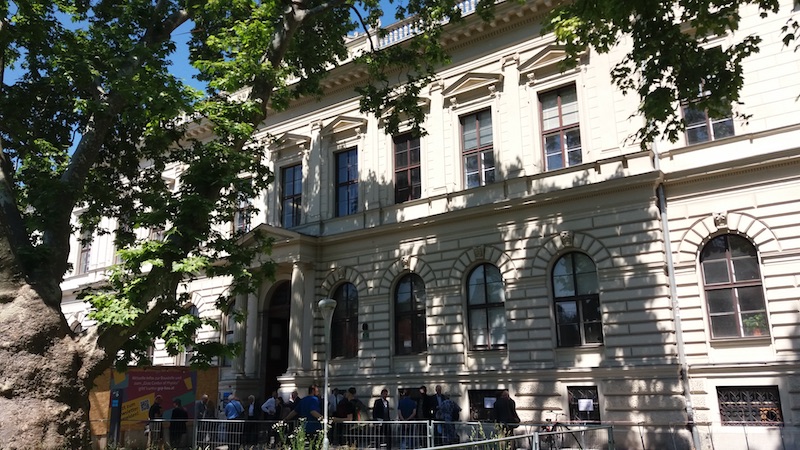
Front side of the institute of physics of the University of Graz - Image credit: Gina Gunaratnam/EPS
Authors: Sonja Draxler and Heinz Krenn
Following the decision on 16 November 2023, the building of the
Institute of Physics at the University of Graz has been honoured with
the distinction of an EPS Historic Site, an award of great importance for
achievements in physics and research. The nomination is the result of an
initiative by the First European Centre for the History of Physics
(ECHOPHYSICS, founded by Peter Maria Schuster).
In a festive
ceremony on 7th June 2024, a commemorative plaque was unveiled by Mairi
Sakellariadou, President of EPS, and Peter Riedler, Rector of Graz
University, on the facade of the physics building at Universitätsplatz
5 in Graz.
The celebration was embedded in a symposium on the historical
construction of the physics building and its leading figure Ludwig
Boltzmann. It was a special honour for us that a great-grandson of Ludwig
Boltzmann, Dieter Fasol, also participated in the symposium and gave a
lecture on “Ludwig Boltzmann, Ilse M. Fasol-Boltzmann and Artificial
Intelligence”.
The physics institute was built between 1872-1876 under the supervision of the physicist August Toepler and
was considered one of the most modern physics research centres at the
time. What was so special about this building? Sun ray corridors running
through the entire ground floor of the building enabled optical
experiments to be carried out in all rooms using heliostats. At the back
side of the building iron-free rooms for galvanometric measurements
were established, and an astronomical observatory was attached to the
building.
August Toepler himself unfortunately could not use this
modern building for his studies as he was appointed to the Royal Saxon
Polytechnic in Dresden and left Graz in 1876. Ludwig Boltzmann was
appointed as his successor. In 1876 he moved into the new institute
building in his second professorship in Graz as full professor of
general and experimental physics.
Besides Ludwig Boltzmann, a
number of other renowned physicists worked, researched and taught in
this building: August Toepler, Albert von Ettingshausen, Walther Nernst,
Svante Arrhenius, Alfred and Kurt Wegener, Viktor F. Hess, Erwin
Schrödinger, Adolf Smekal, Hans Benndorf, Paul Urban, Otto Burkard,
Wilhelm Nordberg, Günther Porod.

Floor plan from the building according to designs by August Toepler - Image credit: W. Höflechner, Archiv der Univ. Graz, post-processed by H. Krenn

Physics Lecture Hall in 1913 - Image credit: K. Rumpf, Publications of the Archive Univ. Graz, vol. 40, post-processed by H. Krenn

Unveiling the memorial plaque by EPS President Mairi Sakellariadou and Rector Peter Riedler on 7th June 2024
Image credit: K. Tzivanopoulos, Univ. Graz, Communications and Public Affairs
Tags:
distinction
EPS Historic Sites
Erwin Schrödinger
Kurt Wegener
Ludwig Boltzmann
University of Graz
Viktor F. Hess
Permalink
|
|
|
Posted By Administration,
Monday 24 June 2024
Updated: Monday 24 June 2024
|
Author: Alfredo Portone
On 14th-15th May, the Energy Group (EG) of the European Physical Society
met in Cadarache (France) for its annual meeting that, this year, was
celebrated at the Cadarache Château just next to the chantier of the largest nuclear fusion experiment under construction: the International Thermonuclear Experimental Reactor (ITER).
On 14th May, 19 EPS members gathered at the Cadarache Château to visit the ITER site
located nearby. After a brief lunch at the ITER canteen the group was
briefed by three members of the ITER Staff about the project,
its key features, and the visit highlights.
The group first
visited the Assembly Hall where the main reactor components are
pre-assembled prior to their transport inside the neighbouring tokamak
pit for final assembly. The assembly hall is just overwhelming for its
dimensions and amount of high-tech equipment it contains. Two
superconducting Toroidal Field coils were located on the pre-assembly
station together with one of the nine 40-deg vacuum vessel sector.
Similarly, in the Central Solenoid area of the hall, 2 modules of the CS
coils stack were also being assembled.
Then the group moved to
the tokamak pit where the final tokamak will be located and where the
actual fusion experiments will take place. The pit is less impressive
but far more important for the final function it will play. This is a
higher quality clear area that will be soon very crowded by hosting an
increasingly large number of components that will be finally assembled
inside it. At present only the 2 lowermost Poloidal Field (PF) coils
(PF5 and PF6) are installed down inside the pit.
Following the
visit, at 5 PM the group returned to the Château where the workshop
started to focus on four main themes: (a) critical issues associated to
the present EU de-carbonization plans ( “energy trilemma”), (b)
developments in the field of energy production and optimization
(fission, fusion, energy storage, etc.), (c) impact of global warming on
society, for example in terms of natural disasters and (d) contribution
of EPS to the discussion on energy matters within the EU institutions.
Regarding
this last point, the presence of Prof. Mairi Sakellariadou (new EPS
President) was particularly appreciated. Indeed, Mairi presented her
views on the priorities and goals that the EPS-EG should be focussing on
in such dialogue with the EU Institutions. She also showed a strong
interest in following up regularly our group activities.
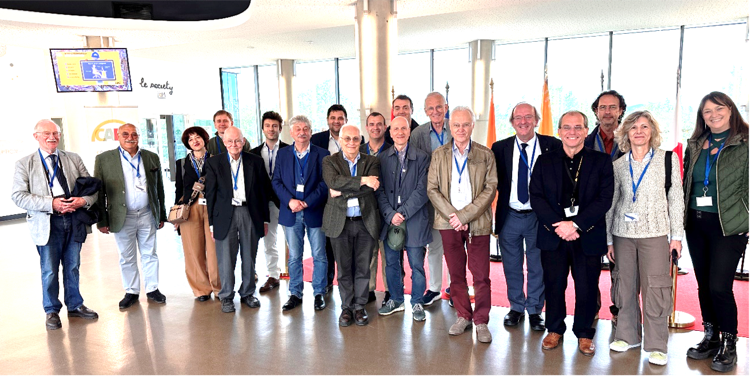
The group of participants at the ITER HQ ready to visit the ITER construction platform.
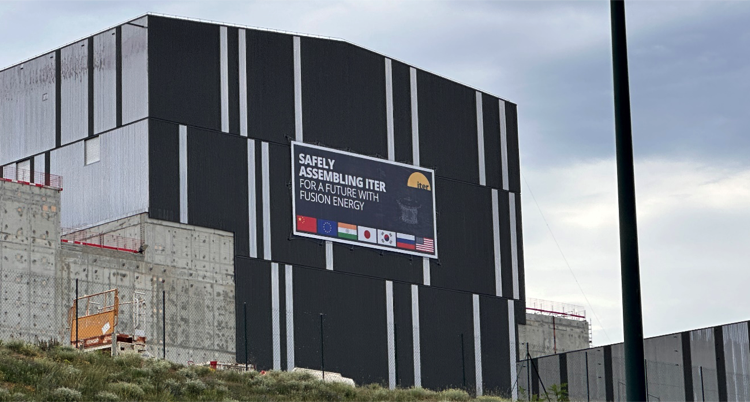
The ITER tokamak building
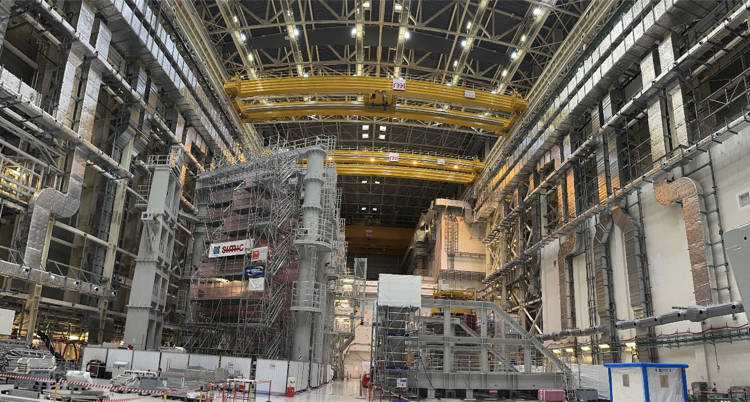
The ITER Assembly Hall
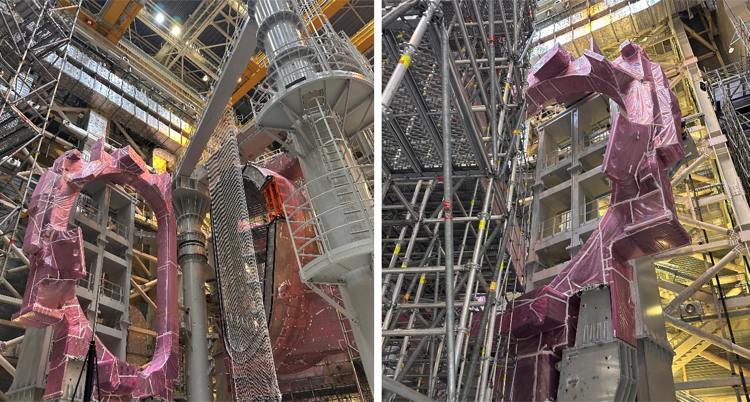
The ITER Assembly Hall: the TF-vessel assembly area (left) and CS assembly area (right).
Inside the ITER Assembly Hall: 2 (wrapped) TF coil is being mounted on the vacuum vessel sector.
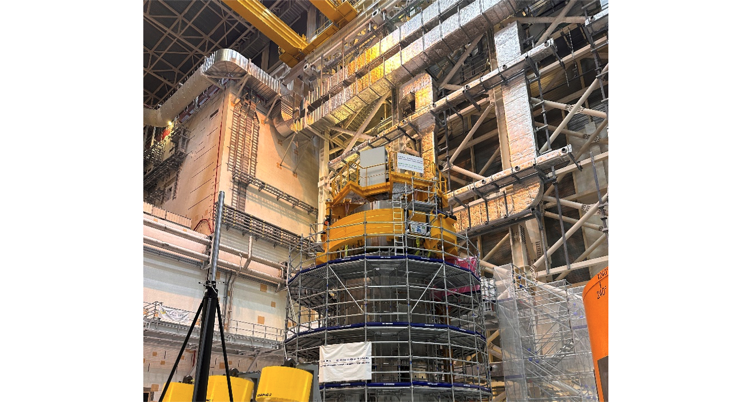
Inside the ITER Assembly Hall: the Central Solenoid coils modules being stacked together.
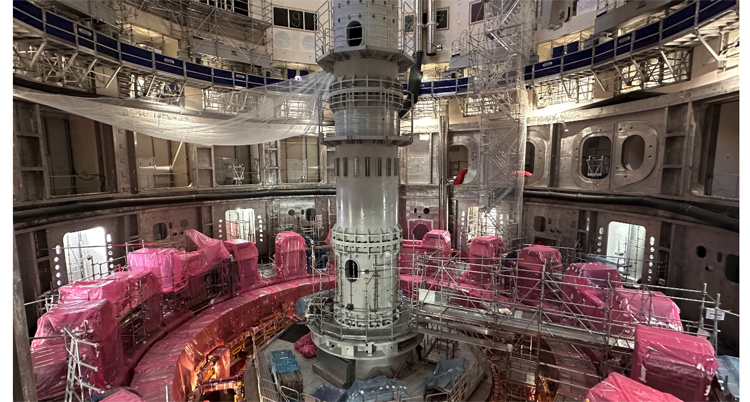
Inside the ITER Tokamak Pit: 18 TF coils gravity supports surround the PF6 coil (all wrapped).
The grey central post will be later replaced by the stack of 6 superconducting coils modules (Central Solenoid).
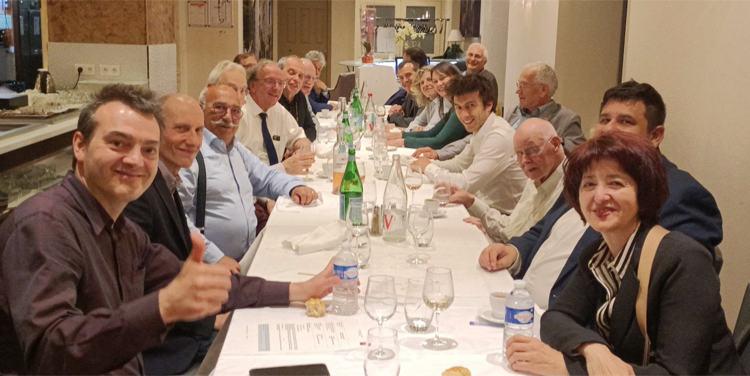
Dinner at the Cadarache Château
Tags:
EPS Energy Group
fusion energy
ITER
Permalink
|
|
|
Posted By Administration,
Monday 24 June 2024
Updated: Monday 24 June 2024
|

As we move towards the second half of 2024 we have many updates to share with you, read on to find out what we’ve been up to...
Discover the latest news from EDP Sciences, an Associate Member of the European Physical Scociety.
Journal de Physique digital archives
To
think that once a journal is archived, no researcher is interested in
it anymore would be a misunderstanding of its continued contextual
value. We were delighted to conduct research recently and discover that
many articles in the Journal de Physique archives are still being cited today.
Find out more about our archives, including the most cited articles in the collection.
The European Physical Journal series
The EiCs of The Editors-in-Chief of EPJ Photovoltaics, Pere Roca i Cabarrocas and Jean-Louis Lazzari, would like to highlight two important papers recently published:
- Georgia Kakoulaki, Nigel Taylor, Sandor Szabo, Robert Kenny, Anatoli Chatzipanagi and Arnulf Jäger-Waldau (2024),
Communication on the potential of applied PV in the European Union: Rooftops, reservoirs, roads (R3),
EPJ Photovoltaics 15, 2 (2024), https://doi.org/10.1051/epjpv/2023035
- Heather
Mirletz, Silvana Ovaitt, Seetharaman Sridhar, Teresa M. Barnes,
Prioritizing circular economy strategies for sustainable PV deployment
at the TW scale,
EPJ Photovoltaics 15, 18 (2024). https://doi.org/10.1051/epjpv/2024015
The EPJ Web of Conferences
team was delighted to publish the proceedings of the 26th International
Conference on Computing in High Energy and Nuclear Physics (CHEP),
organized by Jefferson Lab, which took place in Norfolk, Virginia, from
5–11 May 2023. Read more about the event and discover the proceedings.
The
EPJ Scientific Advisory committee is pleased announce the nomination of
two new members: Konstantinos Bachas, representing the Hellenic
Physical Society (read the news here) and Adam Maj, representing the Polish Physical Society (read the news here)
EPL (Europhysics Letters)
EDP Sciences welcomes the appointment of the new Editor-in-Chief of EPL, Professor Richard Blythe, effective from May 1st. Read more about the experience Professor Blythe brings to the position.
The EPL 2023 Highlights collection
showcases a selection of 40 of the most cited, downloaded and accessed
articles published in EPL in 2023. These articles had a significant
impact on the international community, and cover topics including
“condensed matter physics, network physics, complex systems, black hole
physics, many-body quantum systems to cite a few, as well as recently
growing fields such as quantum information and amorphous topological
matter.”
EDP Sciences Books news
The
training years are often the most important; did you know that Einstein
spent part of his youth in Lombardy, an extremely fruitful and
determining period for the rest of his career? To know more, dig into WHEN ALBERT BECAME EINSTEIN ! Back to the future, you might be interested by RADICAL INNOVATION DESIGN ,
a free e-book about a systematic and usage-driven innovation
methodology to ensure usefulness for users and profitability for
companies !
Join the conversation on social media
We
have many exciting projects planned for 2024 and we look forward to
sharing them with you as soon as we are able. Do follow us on your
social media platform of choice if you'd like to be among the first to
hear from us - we're on LinkedIn, X (Twitter), and Instagram and now Bluesky and Mastodon too!
Tags:
EDP Sciences
EPJ
EPL
EPS AM
EPS Associate Members
publications
social media
Permalink
|
|
|
Posted By Administration,
Friday 14 June 2024
Updated: Friday 14 June 2024
|
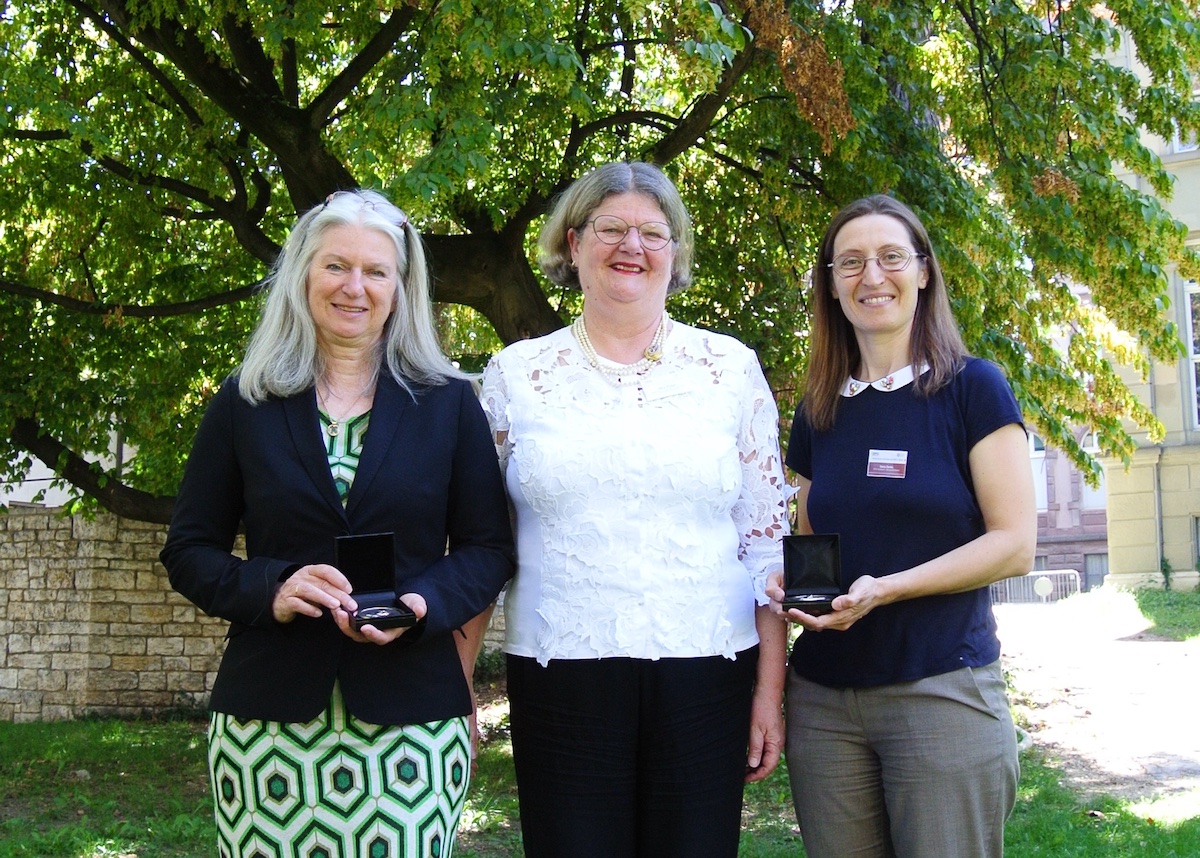
FLTR: Monika Ritsche-Martke, Petra Rudolf and Ilaria Zardo - image credit: Gina Gunaratnam
Petra Rudolf, chair of the EPS Equal Opportunities Committee,
and Gina Gunaratnam, EPS communication coordinator, interviewed Ilaria
Zardo [IZ], from the Department of Physics, University of Basel (CH),
and Monika Ritsch-Marte [MRM], from the of the Institute of Biomedical
Physics, Dept. of Physiology & Medical Physics, Medical University
of Innsbruck (AT). They are laureates of the EPS Emmy Noether
Distinction 2022.
Why did you choose physics?
IZ:
I was interested in Greek, Latin and Philosophy. When I told my parents
I wanted to study physics, it was a big surprise. Especially to my
father who wondered why I had studied all these subjects to "end up"
with sports (in Italian "physics" and "sports" is the same word).
MRM:
I wanted to find a position in relation to Nature. I come from an
academic family, so they encouraged me. But outside, I didn't get
positive reactions. After having attended the Open Days in Innsbruck, I knew
that I wanted to get a master's degree in sciences.
What is the most rewarding aspect of your career and what difficulties did you encounter?
MRM:
It is nice to have recognition from the community but the most
rewarding is when I do active research, when I get results and I
understand things from Nature.
In the 80s', women had to face
difficult times. There were aggressive attitudes. My younger brother
and my husband are also scientists and they were offered positions while
I didn't get one.
IZ: The most rewarding is when I first finish a
project. When I realise that I found something. When I have gone
through all the paths to get where I want to go and I reach it, this is a
rewarding moment. It is also beautiful to see the same way of
thinking/development in people you work with.
Difficulties: We are
trained to be scientists but not to deal with people. You have a strong
contact with your colleagues. You need trust and faith. This is very
challenging.
Recommendations to encourage diversity
IZ:
I am extremely happy to have a very diverse group: different countries,
different backgrounds. I was motivated by a colleague who told me that
you gain much more from someone who is different from you, who will have
another approach to a problem.
MRM: Quotas are important to get
women involved [in research groups] and I don't care about being called
"Quotenfrau" ("quota woman" in German). It shouldn't be the aim but is a
necessary measure to have more women. If they can do the job, they
should be given the chance.
Career and family
MRM:
I married a colleague! So there was competition between us. It is
difficult to get everything you want once you have a family. I consider
it a "fermionic principle ": either you choose the field of research you
are interested or the place where you want to live. You cannot have the
two at the same time. My advice: be determined but flexible. And ask
yourself the following: What is something I cannot live without?
In my case, I changed fields: from theoretical physics, I switched to medical physics.
IZ:
"I am not a hero!" I have three children and my husband is also a
physicist working in industry. I would advise to not pay attention
to judgement. When asked about children, you can answer that your
husband is never asked about them.
More info
Tags:
award
diversity
EPS Emmy Noether Distinction
EPS EOC
EPS Equal Opportunities Committee
interview
medical physics
nanoscience
women in physics
Permalink
|
|
|
Posted By Administration,
Friday 14 June 2024
Updated: Friday 14 June 2024
|

Author: Ariane Wenger
Are you a researcher planning to attend scientific conferences?
Please
consider participating in and distributing this survey on researchers’
expectations of conferences that Ariane Wenger – a doctoral student at
the Transdisciplinarity Lab (TdLab), ETH Zurich – is conducting as part
of her dissertation on changing research exchange practices. The short
(10 minutes) online survey is aimed at researchers of all scientific
disciplines and career stages who are planning to attend scientific
conferences. In particular, opinions and views of researchers from all
around the world are appreciated. Participation in the survey will not
only enrich this study, but will also help to identify avenues for
enhancing current conference practices, benefiting the wider academic
community.
The survey can be accessed here: https://ww3.unipark.de/uc/cexp1/.
Thank you very much for your support!
Tags:
conferences
EPS Associate Members
ETH Zurich
survey
Permalink
|
|
|
Posted By Administration,
Friday 14 June 2024
Updated: Friday 14 June 2024
|

The participants of the EPS Young Minds Leadership Meeting in from of the Henry Ford building in Berlin - image credit: EPS Young Minds
Authors: Anna Grigoryan and Carmen Martín Valderrama
Monday 25th of March was the first day of the Young Minds (YM)
Leadership Meeting (LM) at the EPS Forum 2024 in Berlin. More than 70
participants from the YM network, representing 30 YM sections, as well
as guests from other associations, were welcomed by the LM organization
committee chair Anna Grigoryan, the EPS Secretary General Anne Pawsey
and EPS Former Chair Luc Berge. EPS YM former chair Mattia Ostinato
presented an overview of the YM program and the newly elected YM chair
Carmen Martín Valderrama was presented to the participants. Following
two masterclasses on scientific writing given by the EDP Science Senior
publisher Isabelle Auffret-Babak and Publishing Director Anne Ruimy, the
participants attended the lecture given by Antigone Marino on Impostor
Syndrome. Could not be missing the "From PhD to CEO" panel discussion,
always inspiring, in collaboration with OPTICA. The panelists were
Co-Founder of Keequant Imran Khan and Co-Founder of Quantune Jan
Kischkat.
Tuesday 26th of March, the day started with the Nobel
Prize Laureates' Lectures. The opportunity to attend such interesting
sessions was allowed by the co-location with the EPS Forum. The morning
continued with lecturer Tatevik Chalyan on writing a successful grant
application, after which Steven Goldfarb presented the talk “Why we
bother – the urgency of education and outreach”. To further connect with
other YM delegates, a networking session was conducted and the LM
concluded with the YM activity poster session and the corresponding
“Young Minds Best activity award by EPL” ceremony where the YM sections
PONYS and SPAM Caserta received the winner's certificates from EPL and
250 euros.
The meeting brought together YM delegates from more
than 10 different countries, as well as many interested students and
young researchers from outside of the YM network, making it a great
success. Beyond the programme of the LM, the participants could learn
about industrial opportunities and attend lectures from world-class
researchers conducted in the EPS Forum. Thanks to the European Physical Society and Luc Bergé for the invitation and this opportunity and congratulations to the organization for the success of the event.
We
believe that scientific outreach, cultural exchange and mutual
understanding, and peaceful international collaboration are more
important than ever and we believe that bringing young scientists
together and equipping them with tools and skills is a great way of
fostering these aspects.
We are very excited that so many young minds gathered for the meeting, and we are very much looking forward to the Leadership Meeting in 2025.
Tags:
EPS Forum
EPS Young Minds
meeting
Permalink
|
|
|
Posted By Administration,
Friday 14 June 2024
Updated: Friday 14 June 2024
|
Nominations are sought for the Fritz London Memorial Prize for Low
Temperature Physics, which will be presented at the International Low
Temperature Conference (LT30) in Bilbao, Spain, in August 2025.
The
Fritz London Memorial Prize is an international prize supported by the
endowment created at Duke University by John Bardeen, a generous gift
from the late Horst Meyer, and donations from Oxford Instruments. It is
awarded once every three years and is intended to recognize outstanding
experimental and theoretical contributions to low temperature physics.
Background information and a list of previous London Prize winners can
be found at: https://physics.duke.edu/fritz-london-memorial-prize
The
members of the 2025 London Memorial Prize Committee are: P. Hakonen
(Chair, Aalto U., Finland), Eva Andrei (Rutgers U., USA), Laura Greene
(FSU and MagLab, USA), H. Mooij (TU Delft, Netherlands), and Y. Okuda
(Tokyo Institute of Technology, Japan).
Nominations and supporting letters should be sent to the Chair of the Prize Committee:
Prof. Pertti Hakonen
pertti.hakonen@aalto.fi
Subject: London Memorial Prize
The deadline for the receipt of nominations and supporting letters is November 15, 2024.
The nomination letter should clearly state all of the following:
- The basis for the proposed prize.
- Publications on which the nomination is based.
- An assessment of the impact on the low temperature community.
- Relevant biographical information and institutional affiliation.
- Supporting letters (no more than 4) should be submitted together with the nomination materials.
There
are no restrictions on who could receive this award. It has been the
policy of the committee to avoid giving the award for work that has
already been recognized by the Simon Memorial Prize or by other
comparable awards. The committee also looks more favorably on recent
work as compared to work whose significance has been apparent for a long
time.
Tags:
award
call
conferences
Fritz London
Fritz London Memorial Prize
low temperature
prize
Permalink
|
|
|
Posted By Administration,
Friday 14 June 2024
|
A series of conferences are organised by the European Physical Society through its Conference Service and its Divisions and Groups.
Are you already registered? Check our calendar of events and visit the conference websites to know the deadlines and benefit from early bird registration fees!
This post has not been tagged.
Permalink
|
|
|
Posted By Administration,
Friday 14 June 2024
Updated: Friday 14 June 2024
|
Author: Luc Bergé
On 25th and 26th March, the EPS organised its second Forum at the Henry
Ford Building of Freie Universität Berlin in Germany. Prepared for more
than a year, the EPS Forum welcomed 405 registered participants taken in
charge by 8 EPS staff members and 9 student helpers. 213 master, PhD
students and postdoc fellows from 35 different countries attended this
second edition of the Forum. Unlike its first edition in Paris (2022),
this event hosted a majority of young researchers (53.2% of attendees),
mainly coming from outside the EPS community.
The EPS Forum (www.epsforum.org)
proposed a series of conferences and workshops on the following topics:
Atomic, molecular and optical physics for quantum technologies;
applications of nuclear and particle physics to society; condensed
matter and applications to industry; energy management, pollution and
climate; artificial intelligence, brain inspired processing systems and
applications; and photonics.
The first day (“Physics Meets
Industry”, 25th March) was devoted to the employment of early career
physicists in Europe and fostered direct exchanges with stakeholders of
many industrial companies working in the above fields. It was opened by a
plenary speech given by Iliana Ivanova, European Commissioner for
Innovation, Research, Culture, Education and Youth.
The second day
(“Fundamental Physics”, 26th March) hosted a general conference on
physics, addressing the same fields from a fundamental perspective and
starting with a plenary session that welcomed the Nobel Laureates Anne
L’Huillier, Klaus von Klitzing, Stefan Hell and the ERC Scientific
Council representative Nicola Spaldin. 64 early-career researchers,
including several EPS Young Minds, could present their research during a
poster session organised in the afternoon.
On the whole 70
invited speakers and round table panelists accepted our invitation to
participate in the Forum. The preparation of this major event involved
40 representatives of the EPS Member Societies, Divisions and Groups,
Associate Members, members of the EPS Executive Committee and of the EPS
Secretariat. It also led to an efficient cooperation with the EPS Young
Minds, who held a very successful Leadership Meeting, and the
International Association of Physics Students.
This edition of the
EPS Forum was financially supported by 19 sponsors and 11 exhibitors.
It again demonstrated the possibility to make all the EPS components
regularly work together over a year to promote the young generation of
European physicists, to bridge the gap between academic research and
industry, and to still advertise the latest developments in fundamental
physics at the highest level.
Image credit: Bernhard Wannenmacher

A discussion between Klaus von Klitzing and Stefan Hell

Anne L’Huillier’s plenary talk

Coffee break at the exhibitors’ booth
Tags:
conferences
EPS Forum
Permalink
|
|
|
Posted By Administration,
Tuesday 21 May 2024
Updated: Thursday 23 May 2024
|
Author: Kristel Crombé
The Plasma Physics Division of the European Physical Society is happy to announce its 2024 prizes.
2024 EPS - PPCF Sylvie Jacquemot Early Career Prize
We are pleased to announce that we have received an outstanding array of nominations for the 2024 EPS - PPCF Sylvie Jacquemot Early Career Prize.
The quality of submissions reflects the remarkable talent, the strength
and vitality of our community. We would also like to express our
sincere gratitude to all those who took the time to submit nominations.
After
careful consideration and evaluation of numerous outstanding
nominations, we are delighted to reveal that the winner of the first EPS
- PPCF Sylvie Jacquemot Early Career Prize is:
Dr. Varchas Gopalaswamy from the University of Rochester, USA, for
"the development of statistical modelling to achieve accurate
predictions of laser fusion experiments thereby improving implosions and
achieving record Lawson products for direct-drive on OMEGA".
His
dedication, innovation, and commitment to advancing the field of plasma
physics has truly distinguished him as a rising star in our community.
We extend our heartfelt congratulations to Dr. Varchas Gopalaswamy
for this well-deserved honour. His exemplary work serves as an
inspiration to us all, demonstrating the profound impact that
early-career researchers can have on the field.
In addition to the prize of 1,500 EUR and a certificate, Dr. Varchas Gopalaswamy
has accepted our invitation to give a talk on his work at the 50th EPS
Conference on Plasma Physics, which will take place in Salamanca, Spain,
from July 8th to 12th, 2024.
2024 EPS Plasma Physics Division Innovation Award
With great honour and admiration, we announce that Dr. Anthony B. Murphy
from the Commonwealth Scientific and Industrial Research Organisation
(CSIRO) in Australia is the recipient of the 2024 EPS Innovation Prize.
This honour reflects his significant role in the advancement of thermal
plasma processes, showcasing his reputation as the leading expert in the
field.
Dr. Murphy’s extensive research over more than three
decades has led to groundbreaking developments, especially in predictive
modeling for arc welding. His innovations have improved the precision
and efficiency of metal fabrication processes, marking a significant
step forward in the application of thermal plasmas. His current work in
expanding these models for use in wire-arc additive manufacturing
represents a promising frontier in manufacturing technologies.
His
venture into green plasma technology, particularly his research on the
plasma-catalytic production of ammonia, underscores his commitment to
pioneering sustainable industrial processes. These efforts highlight Dr.
Murphy’s ability to blend scientific inquiry with practical solutions
for environmental sustainability.
Dr. Murphy’s collaborative
endeavors and dedication to the field have not only contributed to the
scientific community but have also spurred innovation across industry.
His work embodies the spirit of the EPS Innovation Prize, celebrating
not just scientific achievement but the practical application and
societal impact of these innovations.
By awarding Dr. Murphy the
EPS Innovation Prize, we not only honour his past contributions but also
recognize his ongoing commitment to innovation. His work serves as an
inspiration for future advancements, embodying the innovative spirit and
pursuit of excellence that the prize aims to celebrate.
2024 EPS PPD PhD Prize
The 2024 EPS PPD PhD Prize has been awarded as follows:
- Dr Lucas Rovige
(Institut Polytechnique de Paris, France) for his thesis “Optimization,
stabilization and optical phase control of a high-repetition rate
laser-wakefield accelerator“
- Dr Baptiste Frei
(École Polytechnique Fédérale de Lausanne (EPFL), Switzerland) for his
thesis “A Gyrokinetic Moment Model of the Plasma Boundary in Fusion
Devices“
- Dr Toby Adkins (University of Oxford,
UK) for his thesis “Electromagnetic instabilities and plasma turbulence
driven by the electron-temperature gradient“
- Dr Mathias Hoppe (Chalmers University of Technology, Sweden) for his thesis “Runaway-electron model development and validation in tokamaks”
Tags:
early career
EPS Plasma Physics Division
EPS PPD
Innovation Prize
PhD prize
prize
Permalink
|
|
|
|